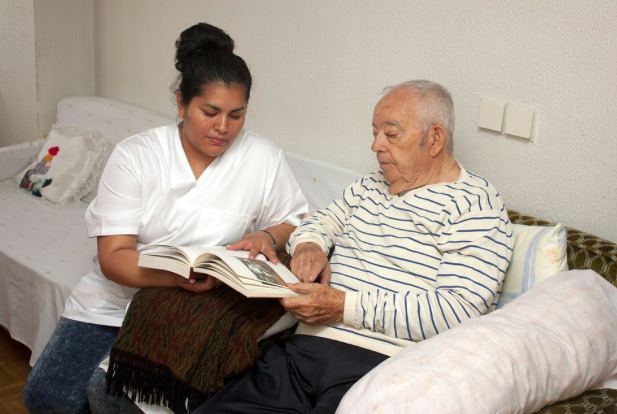How to prepare for taking care of your parents in their twilight years
Even as an adult, you probably still see your parents as figures of strength and safety. They raised you, supported you, and always seemed to be there when you needed them. But the reality is, one day they’ll need your help in return.
Caring for your parents as they age can be an emotional time, which means it’s worth putting some thought into how you’ll cope with the experience. This guide is designed to make your journey as easy as possible, and help ensure your parents stay safe and comfortable in their twilight years.
Gear up for a conversation
 The first step is to accept that the issue is going to arise, and train yourself to be comfortable with the topic. Next you should arrange a family meeting, inviting your parents, siblings, and anyone else who’ll be directly affected.
The first step is to accept that the issue is going to arise, and train yourself to be comfortable with the topic. Next you should arrange a family meeting, inviting your parents, siblings, and anyone else who’ll be directly affected.
Chatting about aged care can be a little overwhelming, not to mention awkward. It’s not the kind of conversation you can just bring up out of the blue, which means arranging a low-key family meeting is a great way to get the ball rolling. Let them know what the meeting’s about, introducing it as something along the lines of:
“A casual chat to help get mum and dad the best care for their needs and wishes, as they get older.”
Depending on your family, the conversation could be heated, teary, defensive, quiet or emotionally draining. Whatever twists and turns it takes, the most important thing to remember is to listen intently to everything each individual has to say. This includes your folks, as well as other members of the group.
Here are some handy tips:
- If possible it’s best to have the conversation in person, as video chats, phone calls or emails don’t provide you with honest emotions, tones, and body language.
- Prepare key questions in advance so you won’t feel flustered or rushed as you try to spark the conversation and keep ideas flowing.
- Keep a notebook on hand to jot down details, information and any other important points
So, what sorts of things should be on the table? Here’s some topics you might like to cover.
 Home care or nursing home?
Home care or nursing home?
One of the biggest questions is where your parents will live out the end of their days, and how they’ll pay for it. Are you parents intent on ageing in their own home, or do they love the idea of moving to an assisted retirement village? It’s often a good idea to visit potential residences and homes before it’s time to make the big decision. Who knows, they might even look forward to it! Many top retirement facilities also have long waiting lists, which means it’s best to get organised as early as possible.
- Warning signs
Identifying the warning signs is an important part of caring for the elderly. Your parents may start to engage in poor eating habits, with weight loss and small appetites tell-tale signs. Poor hygiene is a big one, as bathing and self-care can slip in old age. Their home may start to look dirty and unkempt, with issues like scorched pans, unopened mail, missed appointments and overdue bills all key indicators that it’s time to enlist help.
- Mobility
Mobility can deteriorate quickly, and can make it difficult for your parents to get out of bed, go to the bathroom, climb stairs and safely drive themselves from A to B. If your parents like the idea of staying at home you can look into installing mobility-friendly features like ramps and rails.
Caregiving
 Another big question is whether you want to take on independent caregiving duties. Some families choose to hire professional help, while others prefer to take a hands-on role. Ultimately, this is a personal choice that will depend on your relationship with your parents, their financial situation and individual preferences. Remember, caregiving can take an emotional toll, and can go hand in hand with a host of logistical problems. You may be living thousands of miles away, or have too many personal responsibilities to shuffle around. Splitting caregiving duties with siblings can be a good compromise, as can hiring a part-time caregiver.
Another big question is whether you want to take on independent caregiving duties. Some families choose to hire professional help, while others prefer to take a hands-on role. Ultimately, this is a personal choice that will depend on your relationship with your parents, their financial situation and individual preferences. Remember, caregiving can take an emotional toll, and can go hand in hand with a host of logistical problems. You may be living thousands of miles away, or have too many personal responsibilities to shuffle around. Splitting caregiving duties with siblings can be a good compromise, as can hiring a part-time caregiver.
- Wills
Wills are a tough one, but they’re definitely something that should be touched on while your parents are healthy and sound of mind. You can also chat about things like funeral insurance, as well as the type of burial and style of ceremony they’d like. It doesn’t have to be sombre, and you can touch on elements like their favourite songs, foods, drinks and so on.
Aged care is never an easy conversation. But if you keep the mood light, stay positive and involve everyone in the conversation, it can be a great way to bring the family closer. Not only does planning help ensure your parents receive the care they deserve, but it can also ease your own stress levels as you navigate through a difficult time.









Join the Discussion
Type out your comment here:
You must be logged in to post a comment.